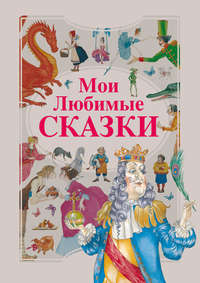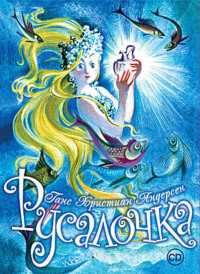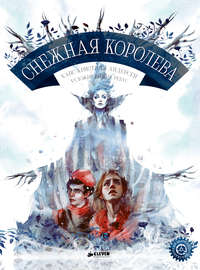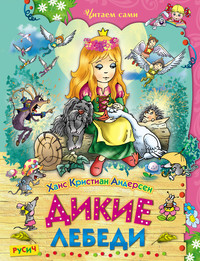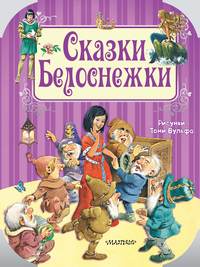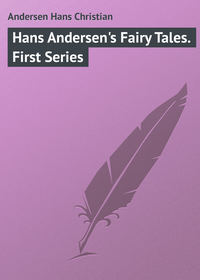 полная версия
полная версияWhat the Moon Saw: and Other Tales
"All males here, and ready," they cried; "and the wives and children too."
"How light we feel!" screamed the young storks in chorus: "it seems to be creeping all over us, down into our very toes, as if we were filled with frogs. Ah, how charming it is, travelling to foreign lands!"
"Mind you keep close to us during your flight," said papa and mamma. "Don't use your beaks too much, for that tires the chest."
And the storks flew away.
At the same time the sound of the trumpets rolled across the heath, for the Viking had landed with his warriors; they were returning home, richly laden with spoil, from the Gallic coast, where the people, as in the land of the Britons, sang in frightened accents:
"Deliver us from the wild Northmen!"And life and tumultuous joy came with them into the Viking's castle on the moorland. The great mead tub was brought into the hall, the pile of wood was set ablaze, horses were killed, and a great feast was to begin. The officiating priest sprinkled the slaves with the warm blood; the fire crackled, the smoke rolled along beneath the roof; but they were accustomed to that. Guests were invited, and received handsome gifts: all feuds and all malice were forgotten. And the company drank deep, and threw the bones of the feast in each others' faces, and this was considered a sign of good humour. The bard, a kind of minstrel, but who was also a warrior, and had been on the expedition with the rest, sang them a song, in which they heard all their warlike deeds praised, and everything remarkable specially noticed. Every verse ended with the burden:
"Goods and gold, friends and foes will die; every man must one day die;But a famous name will never die!"And with that they beat upon their shields, and hammered the table in glorious fashion with bones and knives.
The Viking's wife sat upon the high seat in the open hall. She wore a silken dress, and golden armlets, and great amber beads: she was in her costliest garb. And the bard mentioned her in his song, and sang of the rich treasure she had brought her rich husband. The latter was delighted with the beautiful child, which he had seen in the daytime in all its loveliness; and the savage ways of the little creature pleased him especially. He declared that the girl might grow up to be a stately heroine, strong and determined as a man. She would not wink her eyes when a practised hand cut off her eyebrows with a sword by way of a jest.
The full mead barrel was emptied, and a fresh one brought in; for these were people who liked to enjoy all things plentifully. The old proverb was indeed well known, which says, "The cattle know when they should quit the pasture, but a foolish man knoweth not the measure of his own appetite." Yes, they knew it well enough; but one knows one thing, and one does another. They also knew that "even the welcome guest becomes wearisome when he sitteth long in the house;" but for all that they sat still, for pork and mead are good things; and there was high carousing, and at night the bondmen slept among the warm ashes, and dipped their fingers in the fat grease and licked them. Those were glorious times!
Once more in the year the Viking sallied forth, though the storms of autumn already began to roar: he went with his warriors to the shores of Britain, for he declared that was but an excursion across the water; and his wife stayed at home with the little girl. And thus much is certain, that the poor lady soon got to love the frog with its gentle eyes and its sorrowful sighs, almost better than the pretty child that bit and beat all around her.
The rough damp mist of autumn, which devours the leaves of the forest, had already descended upon thicket and heath. "Birds feather-less," as they called the snow, flew in thick masses, and winter was coming on fast. The sparrows took possession of the storks' nests, and talked about the absent proprietors according to their fashion; but these – the stork pair, with all the young ones – what had become of them?
The storks were now in the land of Egypt, where the sun sent forth warm rays, as it does here on a fine midsummer day. Tamarinds and acacias bloomed in the country all around; the crescent of Mahomet glittered from the cupolas of the temples, and on the slender towers sat many a stork pair resting after the long journey. Great troops divided the nests, built close together on venerable pillars and in fallen temple arches of forgotten cities. The date-palm lifted up its screen as if it would be a sunshade; the greyish-white pyramids stood like masses of shadow in the clear air of the far desert, where the ostrich ran his swift career, and the lion gazed with his great grave eyes at the marble sphinx which lay half buried in the sand. The waters of the Nile had fallen, and the whole river bed was crowded with frogs, and this spectacle was just according to the taste of the stork family. The young storks thought it was optical illusion, they found everything so glorious.
"Yes, it's delightful here; and it's always like this in our warm country," said the stork-mamma; and the young ones felt quite frisky on the strength of it.
"Is there anything more to be seen?" they asked. "Are we to go much farther into the country?"
"There's nothing further to be seen," answered stork-mamma. "Behind this delightful region there are luxuriant forests, whose branches are interlaced with one another, while prickly climbing plants close up the paths – only the elephant can force a way for himself with his great feet; and the snakes are too big, and the lizards too quick for us. If you go into the desert, you'll get your eyes full of sand when there's a light breeze, but when it blows great guns you may get into the middle of a pillar of sand. It is best to stay here, where there are frogs and locusts. I shall stay here, and you shall stay too."
And there they remained. The parents sat in the nest on the slender minaret, and rested, and yet were busily employed smoothing and cleaning their feathers, and whetting their beaks against their red stockings. Now and then they stretched out their necks, and bowed gravely, and lifted their heads, with their high foreheads and fine smooth feathers, and looked very clever with their brown eyes. The female young ones strutted about in the juicy reeds, looked slyly at the other young storks, made acquaintances, and swallowed a frog at every third step, or rolled a little snake to and fro in their bills, which they thought became them well, and, moreover, tasted nice. The male young ones began a quarrel, beat each other with their wings, struck with their beaks, and even pricked each other till the blood came. And in this way sometimes one couple was betrothed, and sometimes another, of the young ladies and gentlemen, and that was just what they wanted, and their chief object in life: then they took to a new nest, and began new quarrels, for in hot countries people are generally hot-tempered and passionate. But it was pleasant for all that, and the old people especially were much rejoiced, for all that young people do seems to suit them well. There was sunshine every day, and every day plenty to eat, and nothing to think of but pleasure. But in the rich castle at the Egyptian host's, as they called him, there was no pleasure to be found.
The rich mighty lord reclined on his divan, in the midst of the great hall of the many-coloured walls, looking as if he were sitting in a tulip; but he was stiff and powerless in all his limbs, and lay stretched out like a mummy. His family and servants surrounded him, for he was not dead, though one could not exactly say that he was alive. The healing moor flower from the North, which was to have been found and brought home by her who loved him best, never appeared. His beauteous young daughter, who had flown in the swan's plumage over sea and land, to the far North, was never to come back. "She is dead!" the two returning swan-maidens had said, and they had concocted a complete story, which ran as follows:
"We three together flew high in the air: a hunter saw us, and shot his arrow at us; it struck our young companion and friend; and slowly, singing her farewell song, she sunk down, a dying swan, into the woodland lake. By the shore of the lake, under a weeping birch tree, we laid her in the cool earth. But we had our revenge. We bound fire under the wings of the swallow who had her nest beneath the huntsman's thatch; the house burst into flames, the huntsman was burnt in the house, and the glare shone over the sea as far as the hanging birch beneath which she sleeps. Never will she return to the land of Egypt."
And then the two wept. And when stork-papa heard the story, he clapped with his beak so that it could be heard a long way off.
"Treachery and lies!" he cried. "I should like to run my beak deep into their chests."
"And perhaps break it off," interposed the stork-mamma; "and then you would look well. Think first of yourself, and then of your family, and all the rest does not concern you."
"But to-morrow I shall seat myself at the edge of the open cupola, when the wise and learned men assemble, to consult on the sick man's state: perhaps they may come a little nearer the truth."
And the learned and wise men came together and spoke a great deal, out of which the stork could make no sense – and it had no result, either for the sick man or for the daughter in the swampy waste. But for all that we may listen to what the people said, for we have to listen to a great deal of talk in the world.
But then it's an advantage to hear what went before, what has been said; and in this case we are well informed, for we know just as much about it as stork-papa.
"Love gives life! the highest love gives the highest life! Only through love can his life be preserved." That is what they all said, and the learned men said it was very cleverly and beautifully spoken.
"That is a beautiful thought!" stork-papa said immediately.
"I don't quite understand it," stork-mamma replied: "and that's not my fault, but the fault of the thought. But let it be as it will, I've something else to think of."
And now the learned men had spoken of love to this one and that one, and of the difference between the love of one's neighbour and love between parents and children, of the love of plants for the light, when the sunbeam kisses the ground and the germ springs forth from it, – everything was so fully and elaborately explained that it was quite impossible for stork-papa to take it in, much less to repeat it. He felt quite weighed down with thought, and half shut his eyes, and the whole of the following day he stood thoughtfully on one leg: it was quite heavy for him to carry, all that learning.
But one thing stork-papa understood. All, high and low, had spoken out of their inmost hearts, and said that it was a great misfortune for thousands of people, yes, for the whole country, that this man was lying sick, and could not get well, and that it would spread joy and pleasure abroad if he should recover. But where grew the flower that could restore him to health? They had all searched for it, consulted learned books, the twinkling stars, the weather and the wind; they had made inquiries in every byway of which they could think; and at length the wise men and the learned men had said, as we have already told, that "Love begets life – will restore a father's life;" and on this occasion they had surpassed themselves, and said more than they understood. They repeated it, and wrote down as a recipe, "Love begets life." But how was the thing to be prepared according to the recipe? that was a point they could not get over. At last they were decided upon the point that help must come by means of the princess, through her who clave to her father with her whole soul; and at last a method had been devised whereby help could be procured in this dilemma. Yes, it was already more than a year ago since the princess had sallied forth by night, when the brief rays of the new moon were waning: she had gone out to the marble sphinx, had shaken the dust from her sandals, and gone onward through the long passage which leads into the midst of one of the great pyramids, where one of the mighty kings of antiquity, surrounded by pomp and treasure, lay swathed in mummy cloths. There she was to incline her ear to the breast of the dead king; for thus, said the wise men, it should be made manifest to her where she might find life and health for her father. She had fulfilled all these injunctions, and had seen in a vision that she was to bring home from the deep lake in the northern moorland – the very place had been accurately described to her – the lotos flower which grows in the depths of the waters, and then her father would regain health and strength.
And therefore she had gone forth in the swan's plumage out of the land of Egypt to the open heath, to the woodland moor. And the stork-papa and stork-mamma knew all this; and now we also know it more accurately than we knew it before. We know that the marsh king had drawn her down to himself, and know that to her loved ones at home she is dead for ever. One of the wisest of them said, as the stork-mamma said too, "She will manage to help herself;" and at last they quieted their minds with that, and resolved to wait and see what would happen, for they knew of nothing better that they could do.
"I should like to take away the swan's feathers from the two faithless princesses," said the stork-papa; "then, at any rate, they will not be able to fly up again to the wild moor and do mischief. I'll hide the two swan-feather suits up there, till somebody has occasion for them."
"But where do you intend to hide them?" asked stork-mamma.
"Up in our nest in the moor," answered he. "I and our young ones will take turns in carrying them up yonder, on our return, and if that should prove too difficult for us, there are places enough on the way where we can conceal them till our next journey. Certainly, one suit of swan's feathers would be enough for the princess, but two are always better. In those northern countries no one can have too many wraps."
"No one will thank you for it," quoth stork-mamma; "but you're the master. Except at breeding-time, I have nothing to say."
In the Viking's castle by the wild moor, whither the storks bent their flight when the spring approached, they had given the little girl the name of Helga; but this name was too soft for a temper like that which was associated with her beauteous form. Every month this temper showed itself in sharper outlines; and in the course of years – during which the storks made the same journey over and over again, in autumn to the Nile, in spring back to the moorland lake – the child grew to be a great girl; and before people were aware of it, she was a beautiful maiden in her sixteenth year. The shell was splendid, but the kernel was harsh and hard; and she was hard, as indeed were most people in those dark, gloomy times. It was a pleasure to her to splash about with her white hands in the blood of the horse that had been slain in sacrifice. In her wild mood she bit off the neck of the black cock the priest was about to offer up; and to her father she said in perfect seriousness,
"If thy enemy should pull down the roof of thy house, while thou wert sleeping in careless safety; if I felt it or heard it, I would not wake thee even if I had the power. I should never do it, for my ears still tingle with the blow that thou gavest me years ago – thou! I have never forgotten it."
But the Viking took her words in jest; for, like all others, he was bewitched with her beauty, and he knew not how temper and form changed in Helga. Without a saddle she sat upon a horse, as if she were part of it, while it rushed along in full career; nor would she spring from the horse when it quarrelled and fought with other horses. Often she would throw herself, in her clothes, from the high shore into the sea, and swim to meet the Viking when his boat steered near home; and she cut the longest lock of her hair, and twisted it into a string for her bow.
"Self-achieved is well-achieved," she said.
The Viking's wife was strong of character and of will, according to the custom of the times; but, compared to her daughter, she appeared as a feeble, timid woman; for she knew that an evil charm weighed heavily upon the unfortunate child.
It seemed as if, out of mere malice, when her mother stood on the threshold or came out into the yard, Helga, would often seat herself on the margin of the well, and wave her arms in the air; then suddenly she would dive into the deep well, when her frog nature enabled her to dive and rise, down and up, until she climbed forth again like a cat, and came back into the hall dripping with water, so that the green leaves strewn upon the ground floated and turned in the streams that flowed from her garments.
But there was one thing that imposed a check upon Helga, and that was the evening twilight. When that came she was quiet and thoughtful, and would listen to reproof and advice; and then a secret feeling seemed to draw her towards her mother. And when the sun sank, and the usual transformation of body and spirit took place in her, she would sit quiet and mournful, shrunk to the shape of the frog, her body indeed much larger than that of the animal whose likeness she took, and for that reason much more hideous to behold; for she looked like a wretched dwarf with a frog's head and webbed fingers. Her eyes then assumed a very melancholy expression. She had no voice, and could only utter a hollow croaking that sounded like the stifled sob of a dreaming child. Then the Viking's wife took her on her lap, and forgot the ugly form as she looked into the mournful eyes, and said,
"I could almost wish that thou wert always my poor dumb frog-child; for thou art only the more terrible when thy nature is veiled in a form of beauty."
And the Viking woman wrote Runic characters against sorcery and spells of sickness, and threw them over the wretched child; but she could not see that they worked any good.
"One can scarcely believe that she was ever so small that she could lie in the cup of a water-lily," said stork-papa, "now she's grown up the image of her Egyptian mother. Ah, we shall never see that poor lady again! Probably she did not know how to help herself, as you and the learned men said. Year after year I have flown to and fro, across and across the great moorland, and she has never once given a sign that she was still alive. Yes, I may as well tell you, that every year, when I came here a few days before you, to repair the nest and attend to various matters, I spent a whole night in flying to and fro over the lake, as if I had been an owl or a bat, but every time in vain. The two suits of swan feathers which I and the young ones dragged up here out of the land of the Nile have consequently not been used: we had trouble enough with them to bring them hither in three journeys; and now they lie down here in the nest, and if it should happen that a fire broke out, and the wooden house were burned, they would be destroyed."
"And our good nest would be destroyed too," said stork-mamma; "but you think less of that than of your plumage stuff and of your moor-princess. You'd best go down into the mud and stay there with her. You're a bad father to your own children, as I said already when I hatched our first brood. I only hope neither we nor our children will get an arrow in our wings through that wild girl. Helga doesn't know in the least what she does. I wish she would only remember that we have lived here longer than she, and that we have never forgotten our duty, and have given our toll every year, a feather, an egg, and a young one, as it was right we should do. Do you think I can now wander about in the courtyard and everywhere, as I was wont in former days, and as I still do in Egypt, where I am almost the playfellow of the people, and that I can press into pot and kettle as I can yonder? No, I sit up here and am angry at her, the stupid chit! And I am angry at you too. You should have just left her lying in the water-lily, and she would have been dead long ago."
"You are much better than your words," said stork-papa. "I know you better than you know yourself."
And with that he gave a hop, and flapped his wings heavily twice, stretched out his legs behind him, and flew away, or rather sailed away, without moving his wings. He had already gone some distance, when he gave a great flap! The sun shone upon his grand plumage, and his head and neck were stretched forth proudly. There was power in it, and dash!
"After all, he's handsomer than any of them," said stork-mamma to herself; "but I won't tell him so."
Early in that autumn the Viking came home, laden with booty, and bringing prisoners with him. Among these was a young Christian priest, one of those who contemned the gods of the North.
Often in those later times there had been a talk, in hall and chamber, of the new faith that was spreading far and wide in the South, and which, by means of Saint Ansgarius, had penetrated as far as Hedeby on the Schlei. Even Helga had heard of this belief in One who, from love to men and for their redemption, had sacrificed His life; but with her all this had, as the saying is, gone in at one ear and come out at the other. It seemed as if she only understood the meaning of the word "love," when she crouched in a corner of the chamber in the form of a miserable frog; but the Viking's wife had listened to the mighty history that was told throughout the lands, and had felt strangely moved thereby.
On their return from their voyage, the men told of the splendid temples, of their hewn stones, raised for the worship of Him whose worship is love. Some massive vessels, made with cunning art, of gold, had been brought home among the booty, and each one had a peculiar fragrance; for they were incense vessels, which had been swung by Christian priests before the altar.
In the deep cellars of the Viking's house the young priest had been immured, his hands and feet bound with strips of bark. The Viking's wife declared that he was beautiful as Bulder to behold, and his misfortune touched her heart; but Helga declared that it would be right to tie ropes to his heels, and fasten him to the tails of wild oxen. And she exclaimed,
"Then I would let loose the dogs – hurrah! over the moor and across the swamp! That would be a spectacle for the gods! And yet finer would it be to follow him in his career."
But the Viking would not suffer him to die such a death: he purposed to sacrifice the priest on the morrow, on the death-stone in the grove, as a despiser and foe of the high gods.
For the first time a man was to be sacrificed here.
Helga begged, as a boon, that she might sprinkle the image of the god and the assembled multitude with the blood of the priest. She sharpened her glittering knife, and when one of the great savage dogs, of whom a number were running about near the Viking's abode, ran by her, she thrust the knife into his side, "merely to try its sharpness," as she said. And the Viking's wife looked mournfully at the wild, evil-disposed girl; and when night came on and the maiden exchanged beauty of form for gentleness of soul, she spoke in eloquent words to Helga of the sorrow that was deep in her heart.
The ugly frog, in its monstrous form, stood before her, and fixed its brown eyes upon her face, listening to her words, and seeming to comprehend them with human intelligence.
"Never, not even to my lord and husband, have I allowed my lips to utter a word concerning the sufferings I have to undergo through thee," said the Viking's wife; "my heart is full of woe concerning thee: more powerful, and greater than I ever fancied it, is the love of a mother! But love never entered into thy heart – thy heart that is like the wet, cold moorland plants."
Then the miserable form trembled, and it was as though these words touched an invisible bond between body and soul, and great tears came into the mournful eyes.
"Thy hard time will come," said the Viking's wife; "and it will be terrible to me too. It had been better if thou hadst been set out by the high-road, and the night wind had lulled thee to sleep."
And the Viking's wife wept bitter tears, and went away full of wrath and bitterness of spirit, vanishing behind the curtain of furs that hung loose over the beam and divided the hall.
The wrinkled frog crouched in the corner alone. A deep silence reigned around; but at intervals a half-stifled sigh escaped from its breast, from the breast of Helga. It seemed as though a painful new life were arising in her inmost heart. She came forward and listened; and, stepping forward again, grasped with her clumsy hands the heavy pole that was laid across before the door. Silently and laboriously she pushed back the pole, silently drew back the bolt, and took up the flickering lamp which stood in the antechamber of the hall. It seemed as if a strong hidden will gave her strength. She drew back the iron bolt from the closed cellar door, and crept in to the captive. He was asleep; and when he awoke and saw the hideous form, he shuddered as though he had beheld a wicked apparition. She drew her knife, cut the bonds that confined his hands and feet, and beckoned him to follow her.


